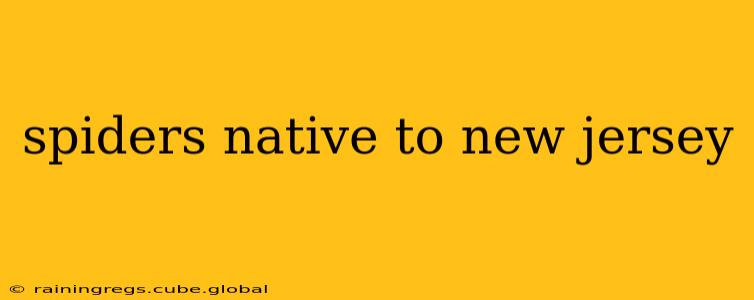New Jersey, with its diverse habitats ranging from coastal beaches to dense forests, is home to a surprisingly large number of spider species. While most are harmless and even beneficial to our ecosystems, understanding which spiders are native to the area and their characteristics can help alleviate any fears and promote responsible co-existence. This guide will explore some common New Jersey spiders, addressing frequently asked questions about their identification, habits, and potential dangers.
What are some common spiders found in New Jersey?
New Jersey's spider population is vast, but some species are more frequently encountered than others. These include the common house spider ( Parasteatoda tepidariorum), the orb-weaver spiders (family Araneidae, encompassing many species), jumping spiders (family Salticidae), wolf spiders (family Lycosidae), and cellar spiders (family Pholcidae). Many other species exist, varying in size, appearance, and web-building techniques. Identifying a specific spider often requires close examination of its physical characteristics, including leg span, body shape, coloration, and the type of web it constructs (if any).
Are there poisonous spiders in New Jersey?
While the vast majority of spiders in New Jersey are harmless to humans, the black widow ( Latrodectus species) and the brown recluse ( Loxosceles reclusa) are the two exceptions to consider. Black widows are recognizable by their shiny, black bodies and distinctive red hourglass marking on their abdomen. Brown recluses are less common in New Jersey and characterized by a violin-shaped marking on their cephalothorax (the fused head and chest region). Their bites can cause localized pain, swelling, and sometimes more severe systemic reactions, warranting medical attention. However, bites from these spiders are relatively rare.
It's crucial to remember that while these spiders possess venom, their bites are often a defensive mechanism. Avoiding direct contact and handling them carefully is the best way to prevent bites.
What is the biggest spider in New Jersey?
Determining the definitively "biggest" spider in New Jersey is difficult, as leg span can vary significantly within a species and even between individuals of the same species. However, some of the larger spiders you might encounter include certain species of wolf spiders and orb-weavers. Wolf spiders are often quite sizable, with some females reaching leg spans of several inches. Large orb-weavers, with their impressive webs, can also appear quite large, but their body size is often less than that of the wolf spiders.
How can I identify a spider in New Jersey?
Precise spider identification requires careful observation and potentially access to field guides or online resources specializing in arachnid identification. Consider these features:
- Body Shape and Size: Note the overall shape of the spider's body (elongated, rounded, etc.) and its approximate size (leg span is often more useful than body length).
- Coloration and Markings: Carefully observe the spider's coloration and any unique markings or patterns on its body. This is crucial for differentiating species.
- Web Type (if present): The type of web a spider constructs—orb web, funnel web, sheet web—is a strong indicator of species.
- Habitat: Where did you find the spider? Its habitat provides clues to its identity.
Detailed photographs are invaluable for identification, and online resources such as BugGuide.net and iNaturalist can assist in identifying spiders based on images.
What should I do if I find a spider in my house?
Most spiders found indoors are harmless and play a beneficial role in controlling insect populations. If you are uncomfortable with spiders inside your home, you can gently capture and release them outdoors. Avoid squashing them, as this can be unnecessarily harmful. Simple preventative measures like sealing cracks and crevices around windows and doors can help reduce the likelihood of spiders entering your home.
Are spiders beneficial?
Yes! Spiders are incredibly beneficial creatures, playing a vital role in controlling insect populations. They are natural predators of many insects considered pests, helping to maintain the balance of our ecosystems.
This guide provides a general overview. For detailed information on specific spider species, consult entomological resources or contact your local agricultural extension office. Remember, most spiders are harmless and best left undisturbed. Understanding their role in the ecosystem allows for respectful coexistence.
